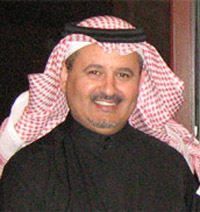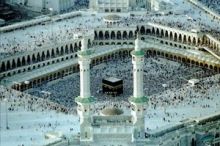The Kingdom of Saudi Arabia is known in the world as one of the richest countries in Middle East, the largest oil exporter, as well as the cradle of Islam and Prophet Muhammad’s place of birth. Mecca and Medina, two cities that are sacred places for Muslims, where the followers of Islam converge on for the week of Hajj, are located there.
This year the Kingdom of Saudi Arabia has opened an embassy in Ukraine, and for the first time in the 19 years of our country’s independence a plenipotentiary ambassador was sent to Kyiv. On the occasion of the Kingdom’s Independence Day which is to be marked on September 23, Saudi Arabia’s Ambassador Extraordinary and Plenipotentiary to Ukraine Mr. Judiya ALHATHAL has kindly agreed to answer few questions of The Day.
Mr. Ambassador, please tell us how your country views further development of bilateral relations between Saudi Arabia and Ukraine? In Riyadh’s view, what spheres are the most promising for our cooperation?
“Let me first say that I’m greatly rejoiced at being able to communicate with your respectful newspaper and its staff, and express my deep respect for its constant desire to seek new acquaintances and solid will to communicate and cooperate with all the peoples of the world, and develop relations between Ukraine and the rest of the world.”
Thank you for your kind words.
“The relations between our countries are on the road of development and growth, which was proved by the three sessions held by the intergovernmental committee.
“The next session of this committee will take place in the first quarter of 2011. In October 2009 we signed the Memorandum on Political Consultations between the two countries, which has been recently ratified by the Kingdom’s Cabinet of Ministers, and the Ukrainian side has already been notified about this. The Memorandum envisages mutual consultations on matters of mutual interest on the bilateral and international levels. The trade turnover between the two countries is also growing, and there are many promising spheres, such as the scientific, economic, agricultural, and health-protection sphere.
“Businessmen of both countries are interested in using the given opportunities. As representatives of the governmental sector we are interested in establishing a general framework and plans that would enable us to move forward and also encourage the private sectors in both countries to act, invest, and export.”
What kind of Ukraine have you discovered personally, in terms of culture and history?
“First, today culture plays a very important role, since it is considered the main factor and a good way of bringing people closer together. As far as my modest knowledge of Ukraine’s culture goes, I can say that your country has a rich cultural variety due to the historical events it has gone through and owing to its connections with other civilizations and cultures. This is a common thing, as most of the world’s countries have gone through similar circumstances, but at the same time Ukraine has preserved its cultural peculiarities.
“The fact that the Kyiv-Mohyla Academy was established here in the 15th century is best proof of the cultural renaissance in Ukraine, as in that period of time the academy was the only establishment of this kind, not only in Ukraine, but in Eastern Europe overall. History proves that Ukraine has many outstanding poets and writers who have made a great contribution to the world culture. Unfortunately, it is impossible to list all the outstanding personalities without offending somebody. Besides, the folkloric arts, the same way as symphonic opera, are the most renowned treasures of the ancient Ukrainian people. In my personal opinion, culture should be given a significant role, because it is a very important factor influencing international policy and is no less important than economy and policy.
“It is no secret that the interest of the Arab world in Ukraine and its affairs, specifically on behalf of the Kingdom, has grown immensely of late. As diplomats and people interested in the development of relations between our countries, we should create open ideas and plans to the advantage of our peoples and in the highest interest of both peoples’ cultures, especially taking into account the fact that life does not boil down to material profit alone, but also has human, religious, cultural and ethic values.”
How does your country view its role in the Middle East?
“The foreign policy of the Kingdom of Saudi Arabia and its role in the Middle East region are based on the following principles, regulations and data (geographical, historical, religious, economic and security):
keeping to the principle of sovereignty and non-intrusion in other counties’ internal affairs, and the will to establish international peace and justice;
refusal from implementation of force, violence and any other actions that would threaten international peace or lead to injustice or tyranny;
keeping to international legal regulations, international multilateral and bilateral agreements and conventions, respecting them both within the framework of the international organizations or beyond them;
establishing relations based on cooperation with friendly states, activating their role within the framework of international and regional organizations.
“The Kingdom of Saudi Arabia enjoys respect and honor throughout the world, owing to its moderate policy, efficiency as a subject of the international community, progressiveness in mutual relations and trust. And it is not without reason that the Kingdom of Saudi Arabia enjoys respect and honor of the international community. It is highly appreciated and acquired recognition, as our government under the leadership of Abdullah Bin Abdulaziz Al Saud, Custodian of the Two Holy Mosques, is carrying out its international commissions connected with providing security, building international peace, and preserving stable growth of the global economy.”
What is Saudi Arabia’s stand in regard to the Iranian nuclear dossier?
“The Kingdom continues to insist that the Middle East region and the Gulf should be deprived of all kinds of weapons of mass destruction, with these criteria being obligatorily used towards all the countries of the region with no exception, including Iran’s nuclear program. In this context the Kingdom always confirms its support of the group of states that are permanent members of the Security Council and Germany (5+1) in settling this question through peaceful negotiations. It also urges Iran to remove all international or regional doubts concerning its nuclear program, especially given that international law stipulates that all states have the right to use nuclear energy for peaceful purposes, meeting the criteria and procedures of the International Atomic Energy Agency (IAEA) and under its aegis.”
Doesn’t your country feel discomfort that Dubai is becoming a new center offering an alternative to the capitalist economic development of the Arab world?
“Dubai is one of the seven Emirates constituting the United Arab Emirates and the second largest after Abu Dhabi. We, in the Kingdom of the Saudi Arabia, consider that every success reached by Dubai or any other city of the region is a joint achievement of all countries of the region, especially taking into consideration the existing cooperation and great trade turnover between the Kingdom of Saudi Arabia and the United Arab Emirates, as well as the fact that both countries are members of the Cooperation Council for the Arab States of the Gulf.”









